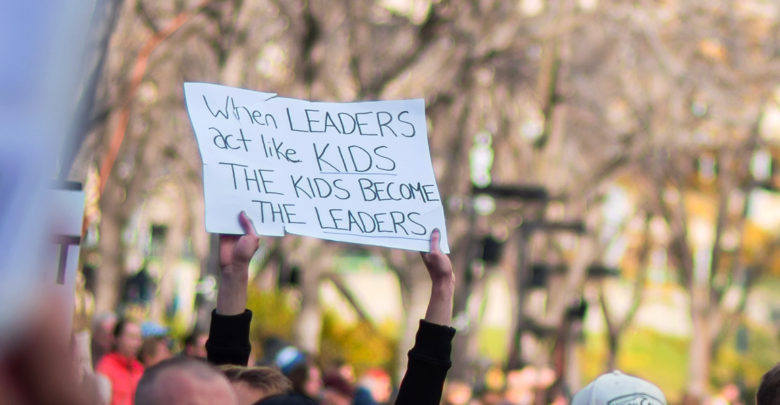When I grow up, I want to be like our children
In a world plagued with injustice, unlikely heroes of political advocacy have risen: children
 Helen Zhang
Helen ZhangWhen I was around 12, I had a green t-shirt with the Earth on it that I wore almost every day to school. The only climate activism I was able to pursue as a child growing up was wearing that green shirt, and being as conscious as possible in reducing, reusing, and recycling. It was always clear back then that adults were the experts, and that children should just listen and let them do the talking.
Ten years later, in the last year of my undergraduate degree, I have stood in multiple crowds of people to look up at the powerful Albertan youth standing on the Legislature steps. They speak confidently into microphones, hold up placards, and self-organize better than most adults I know. Albertan youth have spoken up for their LGBTQ+ peers in gay-straight alliances, participated in Indigenous activism, and fought relentlessly for equitable climate justice.
But not everybody is inspired by this.
You know what I’m referring to — the countless comments from adults expressing that children shouldn’t be wasting their time in protests, that children aren’t smart enough to know what they’re talking about, that children ought to be in school.
In a perfect world, children would not have to protest. In a better world, children would be able to sit in classrooms in pursuit of pure education. But we do not live in a perfect world. Just like you and I, children are citizens of this planet, and are affected by political decisions. Youth activism is not a waste of time: it is important and necessary.
Children are uniquely shut out of political discourses, even though any policy enacted upon in status quo will undoubtedly affect them the most. In a world fraught with oppression and injustice, kids are standing up to fight against what is wrong. These kids do have a good sense of right and wrong — is it so radical to believe that a world where people who are free to love each other and be their true selves is a better world? Is it too much to ask to want school shootings to come to an end?
Many detractors of youth activism are wary of the potential that these children are being exploited. While I can’t say that is an impossible reality, what I do know for certain is this: en masse, these children are actually the foundations to change within their families. Many mistakenly believe, for example, that Greta Thunberg’s parents force her to do activism work — in fact, they initially disapproved of her decision to strike when she began doing it, but grew to understand her motivations through her actions.
It is a political decision to decide to remain publicly apolitical. Only those with privilege have the ability to step in and out of political conversations. Racialized people are unable to step out of their skin; queer people cannot step outside of their being. Our social, political, and environmental climate has necessitated fighting for freedom and for goodness. These children are heroes. Seeing kids mobilize shows that so many children have already learned the hard lesson that you have to put into practice what you believe. That’s something you just can’t learn in a classroom.
At 12 years old, I knew that much needed to be done to make the world a better place. At 22, I’m learning that the way to do that is to have the audacity to stand up for what is good and just; and I’m learning it from less than five-foot-tall 12 year olds whose hope is larger than life.




